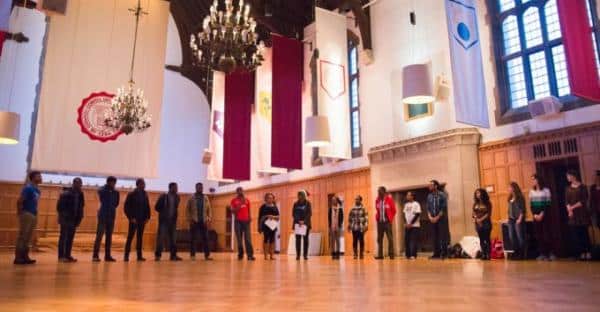
Nearly 100 members of the Cornell community gathered in the Memorial Room of Willard Straight Hall Wednesday to mourn the 148 students killed in the terrorist attack on Garissa University in Kenya last Thursday.
“This attack on Garissa University was an attack on liberty,” said Angela Siele ’17, a member of Kenyans at Cornell. “Such an institution should be a space where freedom and creativity abide, and where fear can have no room to reside.”
Militant group Al Shabbat, an affiliate of Al Qaeda, has claimed responsibility for the attack on the university, The New York Times reported. The gunmen took students hostages, freeing Muslims and killing those who identified as Christians. The attack is the deadliest yet by Al Shabbat, who declared war on Kenya after Kenyan government officials sent its troops to join the African union nation in Somalia in 2012, according to The Times.
“In a time where there is a growing number of attacks worldwide by Muslim fundamentalists, such as the Taliban in Pakistan and ISIS in Syria, such attacks in Kenya cannot be an isolated problem, but an increasingly global problem,” Siele said.
Mercy Kiprotich ’17 echoed the sentiment that this attack is part of a global trend — one which concerns people from all countries.
“This not only affects the specific countries, but the world too,” she said. “I think it is important to realize that this can happen anywhere and it should be a means to draw people together to work for peace and ensure safety for all.
To honor the students killed in the terrorist attack, members of Kenyans at Cornell relayed student accounts of the attack and read aloud the names of the 148 students who lost their lives. Johannes Njoroge ’16 said the vigil was an opportunity to “reflect on these events, empathize with all who have been affected and sow hope in the hearts of everyone attending.”
“We are here to join Kenyans across the political and social spectrum in one voice — to condemn a group that kills innocent civilians,” Siele said. “We are here to say that Al Shabbat’s attempt to create a religious war is a failure. There is no religious war and there will not be a religious war in Kenya.”
Joseph Outa ’18 recounted the anger and grief he said he felt when he first heard about the attack.
“I was angry with the terrorists for such a cowardly act. I was angry with the Kenyan Government for not being able to detect, contain or prevent the damage that was caused,” he said. “This energy was directed to a conversation with [others in Kenyan and at Cornell] about how we could raise awareness and promote further discourse regarding terrorism.”
Joseph Kinhang’a ’17 also expressed hope that the vigil will raise awareness on Cornell’s campus about the global problems that this tragedy brings to light.
“I hope that the vigil will be the much needed catalyst in making the [campus] community aware of the terrorist groups that are causing havoc across Africa and the Middle East,” he said.
Outa also said he hopes the vigil will start an “ideological revolution” in the Cornell community.
“At events like this, seeds are planted that grow interminably in the people’s hearts,” he said. “We have been fighting a meaningless war, and we have to review our strategies. Hopefully, this vigil is the first step of the thousand mile journey.”
Siele said she appreciated the community’s solidarity and President David Skorton’s public statement on the tragedy, calling the Cornell experience a “testament to the ideal” of liberty.
Salma Mutwfy ’17 encouraged students to combat helplessness with hope.
“I implore you that you should fight to keep helplessness at bay,” she said. “Keep in mind that the product of terrorism first and foremost is terror and fear, and helplessness.”
Mutway said that when people are compelled to despair, “the terrorists have won.”
“So we should hope, not because it makes us feel good or because it is healthy, we should hope because it is the ultimate resistance against the forces of evil.” she said. “Even now when it seems bleak, keep hope alive.”
-cornellsun.com









